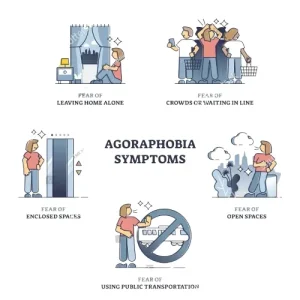Overview
Diagnosis of Agoraphobia
Diagnosing agoraphobia typically involves a comprehensive evaluation to understand symptoms and rule out other health conditions.
-
Symptom review: Your healthcare provider will assess anxiety triggers, frequency of panic episodes, and situations that cause avoidance.
-
In-depth interview: A detailed discussion with a mental health professional helps identify emotional, behavioral, and situational patterns.
-
Physical exam: This is done to rule out any other medical conditions that may cause similar symptoms.
Treatment of Agoraphobia
Treatment often involves a combination of talk therapy and medication. Recovery takes time, but many people experience major improvement with consistent treatment.
Talk Therapy
Talk therapy, also called psychotherapy, is one of the most effective treatments for agoraphobia.
-
Cognitive Behavioral Therapy (CBT): This is the gold standard for treating anxiety disorders. It focuses on identifying negative thought patterns and learning coping techniques to manage panic and anxiety.
-
Exposure therapy: A core part of CBT, exposure therapy helps patients gradually face and reduce their fear of situations that trigger anxiety.
-
Skill-building: Patients learn to:
-
Understand what triggers panic attacks and what makes symptoms worse
-
Cope with and tolerate anxiety sensations
-
Challenge irrational fears and replace them with realistic thoughts
-
Stay in feared situations long enough to learn they are safe
-
Slowly increase exposure to situations they avoid
-
If symptoms are severe and leaving home is difficult, therapists can offer video or phone sessions, home visits, or meetings in safe spaces.
For intense cases, intensive outpatient or residential programs may be recommended. These programs offer structured support to help patients rebuild confidence and manage anxiety more effectively.
Medicines
Certain medications can help reduce symptoms of anxiety and panic and support therapy progress.
-
Antidepressants:
-
The most commonly prescribed are selective serotonin reuptake inhibitors (SSRIs) such as fluoxetine (Prozac) and sertraline (Zoloft).
-
They help manage panic disorder and agoraphobia and may take a few weeks to show full benefits.
-
Other antidepressants may be used based on individual response.
-
-
Anti-anxiety medicines:
-
Benzodiazepines may be prescribed for short-term relief of acute anxiety.
-
Because they can be habit-forming, they’re not recommended for long-term use or for individuals with a history of substance misuse.
-
Important: Starting or stopping antidepressants should always be done under medical supervision, as sudden changes can trigger uncomfortable side effects or even panic symptoms. Doses are usually adjusted gradually.
Support and Coping
-
Therapy and medication work best together for long-term recovery.
-
Support from friends or family can help reduce isolation and build confidence.
-
Early intervention often leads to better outcomes and less severe symptoms over time.
Advertisement

